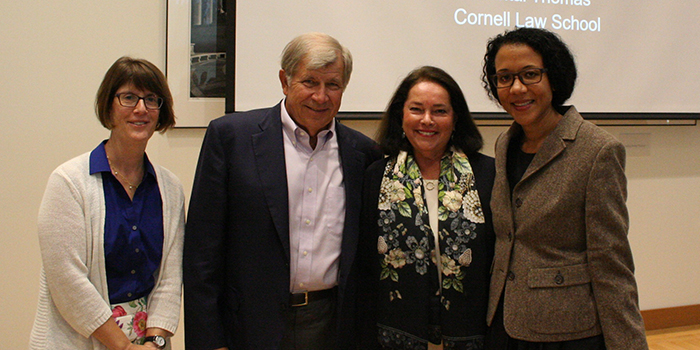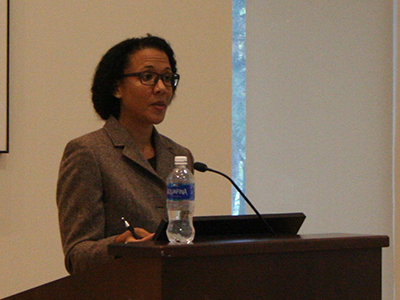When the Aggregate Belies the Truth: Income Inequality and International Economic Law
Professor Chantal Thomas delivers BU Law’s annual Kleh Lecture.

At a time when global poverty is at its lowest, how can it be that income inequality is higher than it has been since the end of the Second World War? How have global trade and international law shaped these trends? Can we connect economic inequality at the domestic and international levels?
These are the questions set out by Professor Chantal Thomas in the 2017 Kleh Lecture. Thomas joins BU Law as the William & Patricia Kleh Visiting Professor in International Law for the 2017–2018 academic year. She is visiting from Cornell Law School, where she directs the Clarke Initiative for Law and Development in the Middle East and North Africa and teaches in the areas of Law and Development and International Economic Law. The Kleh Lecture was made possible by Patricia and William H. Kleh (’71), who established the William & Patricia Kleh Visiting Professorship in International Law in February 2011.
Professor Thomas’s lecture continued a conversation begun at a conference earlier in the Fall semester, Trade Law in the Trump Era: A Transatlantic Perspective, which she organized with BU Law Professor Daniela Caruso. At that event, she discussed distributive justice in the context of trade law and policy and questioned whether economic inequality is linked to increased international trade or technological innovation.
In her Kleh Lecture, Professor Thomas suggested that the argument that global trade is responsible for both the reduction in global poverty and the rise of income inequality belies the reality of concentrated losses in specific industries and geographic locations. In aggregate, the expansion of international trade has allowed many developing countries to relieve poverty, and that poverty reduction has been particularly concentrated in places like China, while at the same time the extreme poor in Sub-Saharan Africa are still barely holding on.
The theory that China’s greater participation in global trade has resulted in its greater reduction of poverty in relation to Africa, Thomas noted, is false. Data has shown that the ratio of trade to gross domestic product is relatively the same in Africa as in other parts of the developing world. Rather, Thomas asserted that the kind of trade a country participates in—especially manufacturing versus agricultural—is a big key to its success in poverty reduction.
In general, Thomas noted that there has been far less liberalization in agricultural trade policies than in other areas: tariffs on agricultural exports remain high, and there are barriers in place for countries moving from primarily agricultural markets into manufacturing markets. Finally, rich countries maintain “substantial [domestic] subsidies on agriculture that have a direct impact on the livelihoods of producers in poor countries.” For example, the US remains the largest exporter of cotton in the world, even though its production costs almost two times more than it does in West and Central Africa, areas of highly concentrated poverty.

Thomas suggested that these international trade policies had led to a “ghettoization of the poorest countries.” While the Doha Development Round of World Trade Organization (WTO) trade talks were launched specifically with the goal of “improving the trading prospects of developing countries and reducing economic inequality,” the negotiations encountered roadblocks and eventually stalled when developed countries refused to compromise on agricultural policies.
“The story of agriculture is just one of many stories one could tell about international trade law,” Thomas said. “One can see the ways in which where economic inequality reflected in and to some degree perpetuated by rules and institutions.”
If trade openness is not necessarily the solution, is it the problem? Thomas pointed to the water contamination crisis in Flint, Michigan as an illustrative example. As a former “manufacturing powerhouse,” Professor Thomas placed the scandal in Flint—notable not only for the crisis itself but also for the government’s failure to respond effectively—in a “larger narrative of de-industrialization and manufacturing decline.”
In Michigan, and the US more broadly, the theory in vogue recently has been that international trade, especially the North American Free Trade Agreement (NAFTA), is to blame for the loss of manufacturing jobs. However, most studies of NAFTA have shown a net positive, if modest, effect. Even though trade deficits have increased in some areas, the US economy has moved toward other industries, like services, in which the country has a trade surplus with many of its trading partners. “The aggregate picture doesn’t reflect the impact on specific industries,” Thomas said, “some areas showed concentrated losses, and one of those was the auto industry.”
The problems, Thomas notes, were exacerbated but not created by NAFTA. She argues that the US did not sufficiently invest in retraining workers and providing social safety nets, a strategy used by some European countries when they also experienced concentrated job losses. Further, the expansion of international trade occurred at a time when the view was ascendant that “a market-based solution to a social problem is always preferable to solutions that require government intervention.”
Flint—like the cotton-producing countries of West and Central Africa—was “a loser in the global economic game,” Thomas said. Its basic public services were cut, and while “there was no connection between the international trade law and the defunding of a local public water facility, both arose in the same global economic and normative climate.”
The way forward, she suggests, is to be more mindful not only of the role of international law, but of the ideologies that inform it. “We have to talk about how economic ideology intersects with ideologies of class, gender, and race,” Thomas said. Noting that the majority of Flint residents are African American, she stressed that “we have to ask whether we tolerate the inequities of globalization because they disproportionately affect those who already occupy a subordinate social status.”
